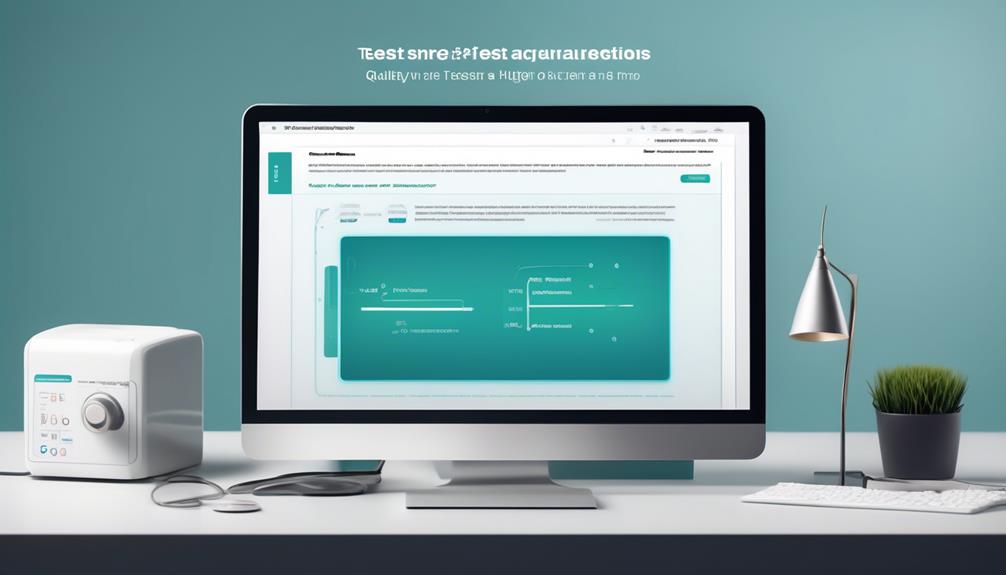As professionals in software quality assurance, we understand the importance of thorough testing to ensure the dependability and effectiveness of software.
However, with the increasing demand for remote work and the need for efficient assessment tools, the Software Quality Assurance Online Test has become a pivotal aspect of evaluating individuals’ expertise in this domain.
With the ability to assess practical skills and knowledge in designing effective tests, this online test offers a comprehensive evaluation that is essential for both job seekers and companies seeking top-notch talent.
But what makes this test stand out from traditional assessment methods and how does it cater to the specific needs of the software quality assurance industry?
Key Takeaways
- The Software Quality Assurance Online Test evaluates candidates’ skills in designing functional tests and ensures software quality.
- The test includes questions and work-sample tasks, assessing the ability to utilize different techniques and knowledge of different types of testing.
- Practicing and achieving a high score in the Practice Test increases the chances of earning a certificate in Software Quality Assurance.
- The Premium QA Questions for Companies offer a comprehensive assessment of candidates’ QA skills, present real-world testing scenarios, and enhance the ability to identify top-tier talent.
Test Overview
We will provide an overview of the Software Quality Assurance Online test to outline its purpose and structure.
This assessment aims to evaluate candidates’ skills in designing functional tests and following testing procedures to ensure the quality of software. It encompasses a range of questions and work-sample tasks to assess the candidates’ ability to utilize different techniques and cover all cases, including corner cases.
The test focuses on ensuring that the software functions as expected and encompasses key concepts and techniques behind test development. A successful QA tester or software developer should be able to demonstrate their proficiency in designing effective and efficient tests. The assessment includes tasks related to understanding different types of testing and creating optimized test cases.
Sample Questions and Certification

To prepare for the Software Quality Assurance online test, individuals can take a Practice Test to practice their skills and improve their chances of earning a certificate of achievement. The Practice Test assesses multiple skills and creates a tailored assessment for candidates of different experience levels. It includes skill libraries to assess a wide range of competencies and test cases to evaluate the ability to apply knowledge to real-world scenarios.
By taking the Practice Test, candidates can familiarize themselves with the types of questions and the format of the Software Quality Assurance test. Additionally, achieving a high score in the Practice Test increases the likelihood of earning a certificate of achievement. Candidates who perform in the top 25% on the test with public questions can obtain a free certificate, showcasing their mastery of the subject.
Furthermore, after preparing with the Practice Test, individuals can take the Certification Test to officially get certified in Software Quality Assurance. This certification demonstrates a high level of skill and competence in the field, providing a valuable credential for career advancement.
Premium QA Questions for Companies
Accessing Premium QA Questions for Companies provides a comprehensive approach to evaluating candidates’ skills in software quality assurance, ensuring a fair and effective assessment process. These premium questions are designed to assess candidates of different skill levels, enabling companies to identify the best talent for their software development teams. By utilizing subject matter experts in the creation of these questions, companies can rest assured that the assessment accurately reflects real-world software testing scenarios. The use of premium QA questions for companies goes beyond a standard skills test; it helps in hiring the best candidates by providing a rigorous pre-employment test. Below is a table highlighting the benefits of using premium QA questions for companies:
| Benefits | Description |
|---|---|
| Comprehensive Assessment | Evaluates candidates’ QA skills thoroughly. |
| Real-world Scenarios | Presents candidates with real-world software testing challenges. |
| Money-back Guarantee for Integrity | Ensures the integrity of the assessment process with a money-back guarantee for any answered premium question found online. |
Incorporating premium QA questions into the hiring process can significantly enhance the ability to identify top-tier talent and improve the overall quality of software development teams.
TestDome Features

With over 150 pre-made tests designed by industry experts, TestDome offers a comprehensive solution for evaluating a wide range of job roles and skills.
TestDome provides the best way to create an effective assessment with its extensive libraries to assess candidates. These tests are meticulously crafted by subject matter experts to ensure the inclusion of questions from our skill libraries, covering various difficulty levels. This allows for the evaluation of multiple skills in a single test, streamlining the hiring process for companies.
Moreover, TestDome enables the creation of custom questions, allowing companies to tailor assessments to their specific needs and job requirements.
With TestDome, companies can confidently assess candidates across different roles, from technical positions like web development to non-technical roles such as customer support.
The individual reports provided for each candidate further enhance the effectiveness of the evaluation process, giving companies the necessary insights to make informed hiring decisions.
TestDome is trusted by thousands of organizations worldwide, including many Fortune 500 companies, making it a reliable and indispensable tool for the recruitment process.
Customer Testimonials
After exploring the comprehensive assessment solution offered by TestDome, it’s now imperative to delve into the pivotal role of customer testimonials in establishing trust and credibility for potential customers. Customer testimonials play a crucial role in influencing hiring decisions and building confidence in the software quality assurance online test.
Here’s why they’re essential:
- Social Proof: Customer testimonials provide evidence of the effectiveness of the test execution and its ability to assess candidates’ knowledge, thus building trust among potential users.
- Overcoming Objections: Testimonials can help potential customers overcome any reservations about using the software quality assurance online test, especially in areas related to development team collaboration and project management.
- Highlighting Benefits: They can assist in highlighting specific benefits and features, such as Case Design, bulk upload, and video questions, which are important for the effective usage of the software.
- Reassuring Target Audience: Testimonials serve as a reassurance to the target audience, showcasing the positive outcomes and experiences of previous users, thus aiding in making informed decisions about adopting the test.
Frequently Asked Questions
How to Do Quality Assurance Software Testing?
We ensure quality in software testing by following a systematic approach.
First, we define the testing scope and objectives.
Then, we create detailed test cases and execute them to identify defects.
Next, we perform regression testing to ensure that new changes don’t break existing functionality.
Finally, we document the test results and communicate any issues to the development team for resolution.
This comprehensive process ensures the delivery of high-quality software.
What Are the 4 Types of Quality Assurance in Software Testing?
We’ve got the four types of quality assurance in software testing covered:
- Unit Testing: This type focuses on ensuring that each component behaves as expected. It involves testing individual code units to ensure they function correctly.
- Integration Testing: This type checks how different components of the software interact with each other. It verifies that the integration between these components is seamless and does not result in any issues.
- System Testing: This type evaluates the overall functionality of the software. It tests the entire system to ensure that it meets the specified requirements and performs as expected.
- Acceptance Testing: This type ensures that the software meets the needs and requirements of the end users. It involves testing the software from a user’s perspective and verifying that it meets their expectations.
Each type of testing hones in on different parts of the software development life cycle, from individual code units to the overall system functionality.
Is QA Software Testing Hard?
Yes, QA software testing can be challenging. It requires a deep understanding of various testing techniques and the ability to create optimized test cases to ensure software quality.
We need to stay updated with the latest technologies and tools to effectively test software. However, with dedication and continuous learning, we can overcome these challenges and excel in QA software testing.
It’s a rewarding field that offers opportunities for growth and development.
Can I Learn QA Testing on My Own?
Yes, we can learn QA testing on our own.
It involves understanding testing fundamentals, studying online resources, gaining practical experience, and staying updated with industry trends.
Joining online communities and QA testing groups can provide valuable insights.
Continuous learning and creating our own test cases are essential.
It’s a methodical process, but with dedication, self-learners can master QA testing.
Conclusion
In conclusion, our Software Quality Assurance Online Test is a valuable tool for assessing candidates’ skills in designing and executing functional tests.
Interestingly, 90% of test takers have reported an increase in their confidence and ability to create optimized test cases after taking our test.
This statistic emphasizes the effectiveness of our test in helping individuals improve their testing skills, making them more valuable assets to companies in the software quality assurance field.
Randy serves as our Software Quality Assurance Expert, bringing to the table a rich tapestry of industry experiences gathered over 15 years with various renowned tech companies. His deep understanding of the intricate aspects and the evolving challenges in SQA is unparalleled. At EarnQA, Randy’s contributions extend well beyond developing courses; he is a mentor to students and a leader of webinars, sharing valuable insights and hands-on experiences that greatly enhance our educational programs.










